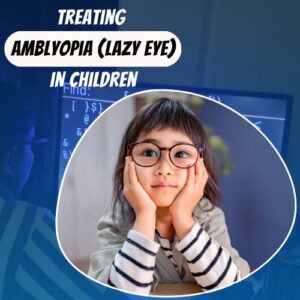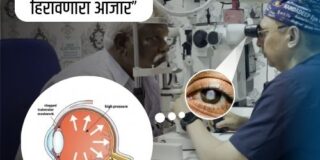What is Glaucoma? Early Signs and Available Treatments at Nandadeep
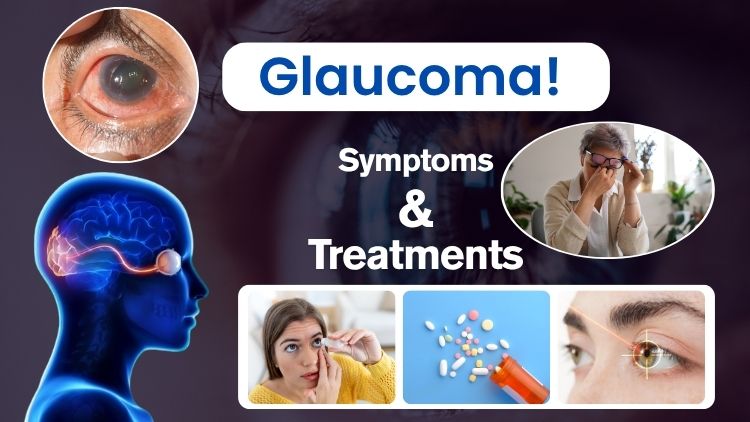
Glaucoma is one of the leading causes of permanent blindness globally, and what makes it particularly dangerous is that most individuals don’t realise they have it until significant vision loss has occurred. Often called the “silent thief of sight,” glaucoma damages the optic nerve slowly and usually shows no early warning signs or symptoms. By the time noticeable vision changes appear, irreversible damage may already be done.
At Nandadeep Eye Hospital, we strongly believe that the most powerful weapons against this vision-threatening eye disease are awareness, regular eye check-ups, and early diagnosis. In this blog, we aim to educate you on the types of glaucoma, common symptoms to watch out for, and the advanced glaucoma treatments we offer to help detect, manage, and control this condition before it progresses.
Understanding Glaucoma
Glaucoma is a collection of eye conditions which damage the optic nerve, which is the essential link between the brain and the eye. Although glaucoma can develop even with normal eye pressure, unnecessary Intraocular Pressure (IOP) can often be the cause of this damage.
Early Signs and Symptoms
Glaucoma often shows no early symptoms, especially in open-angle types. But some warning signs include:
- Gradual loss of side (peripheral) vision
- Blurred or hazy vision
- Eye pain or pressure
- Halos around lights, especially at night
- Sudden vision loss (in acute angle-closure glaucoma)
If you notice any of these signs, consult with Glaucoma eye specialist immediately.
Common Types of Glaucoma:
- Open-Angle Primary Glaucoma
is the most common type. Before there is a noticeable loss of eyesight, it grows gradually and shows no signs.
- Angle Closure Glaucoma
is caused by the fluid in the eye suddenly becoming blocked, which makes the pressure rise quickly.
- Normal Tension Glaucoma
Normal eye pressure does not prevent injury to the optic nerve.
- Congenital Glaucoma
is an uncommon disorder caused by aberrant eye development that manifests at birth.
- Secondary Glaucoma
arises from damage, inflammation, or another ocular ailment.
Causes and Risk Factors
Several factors can increase your risk of developing glaucoma:
- High eye pressure (IOP)
- Family history of glaucoma
- Age over 40, especially in the Indian population
- Diabetes, hypertension, or thyroid disorders
- Prolonged use of steroid medications
- Previous eye injuries or surgeries
Being aware of these risk factors can help you and your eye care provider stay ahead of the disease.
The Importance of Regular Eye Check-ups
Regular eye exams are important because glaucoma can slowly harm your vision, particularly if you have medical conditions or are over the age of 40. For high-risk patients, we advise regular eye checkups in order to identify glaucoma early and avoid permanent vision loss.
Diagnostic Services at Nandadeep
At Nandadeep Eye Hospital, we use cutting-edge technology and advanced diagnostic tools to ensure early and accurate glaucoma diagnosis and treatment.
- Tonometry: The intraocular pressure is measured.
- Perimetry (Visual Field Test): Identifies loss of peripheral vision
- OCT (Optic Coherence Tomography): produces fine-grained pictures of the optic nerve
- Gonioscopy: The drainage angle inside the eye is examined
- Fundus Examination: Evaluates the health of the optic nerve
Glaucoma Treatments Available
While glaucoma damage is irreversible, early treatment can slow or stop its progression. We offer a range of treatments tailored to each patient:
1. Medications
- Eye drops to lower IOP
- Oral medicines for serious or critical circumstances
2. Laser Treatments
- Selective Laser Trabeculoplasty (SLT) – Helps open-angle glaucoma patients drain fluid better.
- Laser Iridotomy – Creates a small opening in the iris to relieve pressure in angle-closure glaucoma
3. Surgical Procedures
- Trabeculectomy – Creates a new drainage path for fluid
- Glaucoma Drainage Devices – Tubes or implants to reduce eye pressure
- Minimally Invasive Glaucoma Surgery (MIGS) – Advanced procedures with shorter recovery time
Glaucoma specialists will recommend the best treatment based on the stage and type of glaucoma.
Living with Glaucoma
Living with glaucoma requires lifelong care and monitoring:
- Take prescribed medicines as recommended.
- Don’t miss follow-up appointments.
- Keep your eyes safe from harm and strain.
- Keep a healthy lifestyle, including limiting your blood pressure and blood sugar.
With proper care and vigilance, most patients with glaucoma can maintain good vision for life.
Why Choose Nandadeep Eye Hospital for Glaucoma Care?
- Expert Glaucoma Specialists
Highly experienced doctors with years of specialization - Advanced Technology
Cutting-edge diagnostics and modern surgical options - Patient-Centered Approach
Personalized care plans and constant support
Hassle-free scheduling and reminders- Expert Glaucoma Specialists
Conclusion
Although often silent in its progression, glaucoma can lead to severe and irreversible vision loss if left untreated. However, with early glaucoma detection, timely intervention, and regular eye examinations, it is possible to preserve your eyesight for life.
Schedule Your Eye Check-up Today
Don’t wait for symptoms to appear.
Call us or Book your appointment online to get screened for glaucoma and other eye conditions.
More Posts
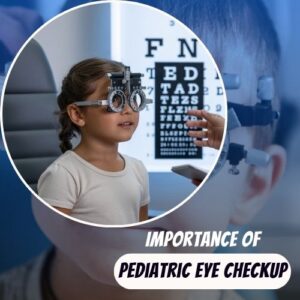
Everything You Should Know About Pediatric Eye Exams
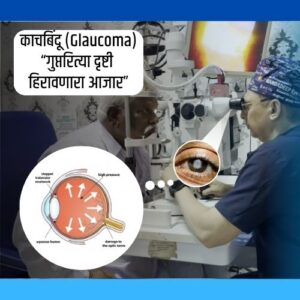
काचबिंदू (Glaucoma): नियमित नेत्रतपासणी का आवश्यक आहे?

